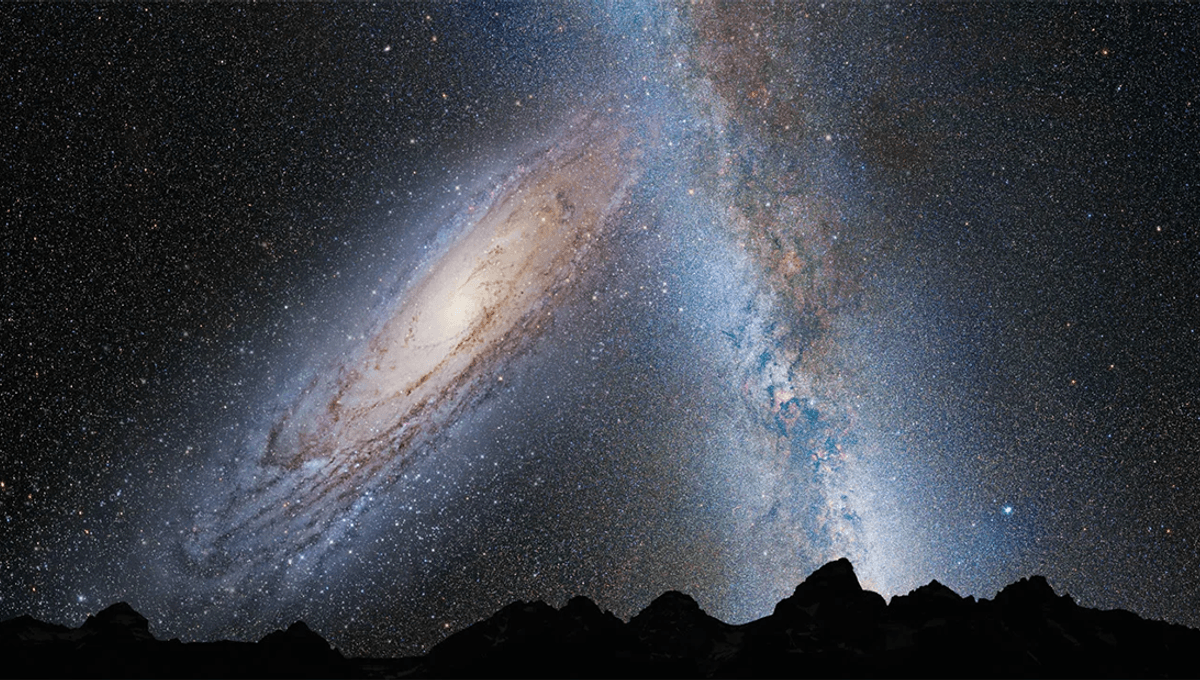
Humans confirmed the existence of other galaxies surprisingly late. Only 100 years ago, in fact, when Edwin Hubble found a type of star known as Cepheid variables within Andromeda, and used them to measure the galaxy’s distance.
Since then, astronomy equipment and techniques have advanced, and more and more data has been collected on Andromeda and many of the estimated 2 trillion galaxies within the observable universe. As luck (or, to be more accurate, distance would have it, given that Andromeda is one of our closest neighbors) we soon found evidence that the first galaxy we discovered beyond our own was likely on a collision course with the Milky Way.
“Traveling at 250,000 mph [402,336 kilometers per hour], the neighboring giant spiral is scheduled to make a head-on encounter with our galaxy about 4 billion years from now,” NASA explains. “Subsequent clashes over 2 billion years will give rise to a combined elliptical galaxy, replete with stars scattered in new orbits. It seems Earth, the Sun and planets in our Solar System will survive the crash but take on new coordinates in the cosmos.”
But observations of Andromeda and our own galaxy are continuous, and as we get better information we can get a better impression of when this collision will take place, if it will happen at all.
In a new study, which has not yet been peer-reviewed, one team looked at the latest and most accurate observations conducted by the Gaia and Hubble space telescopes, as well as more recent assessments of the mass of the galaxies within the Local Group.
The team attempted to identify the areas of uncertainty in the evolution of the Local Group of galaxies and how it will evolve over the next 10 billion years.
“Predicting future mergers requires knowledge about the present coordinates, velocities, and masses of the systems partaking in the interaction,” the team explained in their paper. “In addition to the gravitational force between galaxies, dynamical friction is the dominant process in the lead-up to galactic mergers. It describes a transfer of orbital kinetic energy to internal energy of the objects involved, and consequently leads to the decay of galactic orbits.”
Though these forces all play a part in the final stages of a merger, gravity is what plays the largest role in determining whether galaxies collide. The team looked for areas of uncertainty which could affect the evolution of the group, finding that uncertainty around Andromeda (M31) and Messier 33 significantly alter the chance of a merger between Andromeda and the Milky Way.
“While including M33 increases the merger probability, the orbit of the Large Magellanic Cloud runs perpendicular to the Milky Way-Andromeda orbit and makes their merger less likely,” the team explained. “In the full system, we find that uncertainties in the present positions, motions, and masses of all galaxies leave room for drastically different outcomes, and a probability of close to 50 percent that there is no Milky Way-Andromeda merger during the next 10 billion years.”
The team are, of course, cautious about their findings, and say that more observations are needed to determine whether Andromeda will collide with our galaxy. But “as it stands, proclamations of the impending demise of our Galaxy appear greatly exaggerated.”
The study is posted to preprint server arXiv.
Source Link: Astronomers Place 50/50 Odds On Andromeda Colliding With Us